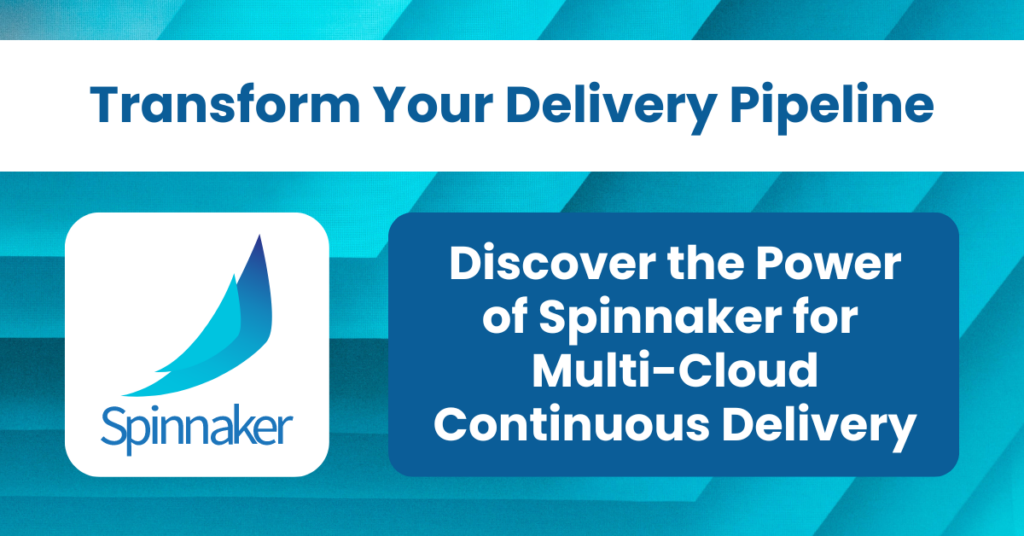Contributed by Anand Patil, originally posted on Medium

Spinnaker is a robust, open source, multi-cloud continuous delivery platform designed to automate the deployment of applications across different environments. It offers a versatile pipeline management system and integrates seamlessly with major cloud providers.
But how do you know if you should use Spinnaker or all these other tools out there, like Jenkins, Azure DevOps, GitLab, and Buildkite?
Here’s how Continuous Integration/Continuous Delivery functions with Spinnaker.
Continuous Integration (CI)
Spinnaker can connect with external CI systems like Jenkins, Travis CI, and AWS CodeBuild to trigger pipelines based on code changes and gather artifacts generated by builds, such as Docker images, JAR files, or other deployable units.
Pipeline Creation
In Spinnaker, you can create pipelines that outline the steps required for deploying your application. These steps may include:
- Baking machine images
- Deploying to different environments (e.g., staging, production)
- Running automated tests
- Executing custom scripts
- Monitoring deployments
Automated Triggers
Pipelines can be automatically triggered by events from your CI system (e.g., availability of a new build artifact) or manually initiated.
Deployment Strategies
Spinnaker supports various deployment strategies, including:
- Highlander: Replaces the previous version with the new one.
- Red/Black (Blue/Green): Deploys the new version alongside the old one, then switches traffic.
- Canary: Gradually rolls out the new version to a subset of users.
Rollbacks
In case of issues, Spinnaker allows easy rollbacks to previous versions of your application.
Monitoring
Spinnaker can integrate with monitoring tools to track the health of your deployments and trigger alerts if problems arise.
Benefits of using Spinnaker for CI/CD:
- Multi-Cloud Support: Spinnaker works with major cloud providers (AWS, GCP, Azure), making it a suitable choice for hybrid or multi-cloud environments.
- Flexible Pipelines: You can create complex, customized pipelines tailored to your specific deployment needs.
- Deployment Strategies: Spinnaker offers various strategies to help reduce downtime and risk during deployments.
- Automated Rollbacks: Rollbacks are straightforward and automated, enabling quick recovery from failures.
- Open Source: Spinnaker is open source, providing free usage and access to a large community of users and contributors.
Here are the key differences I found between Spinnaker, Jenkins, Azure DevOps, GitLab, and Buildkite:
| Feature/ Aspect | Spinnaker | Jenkins | Azure DevOps | GitLab | Buildkite |
| Primary Focus | Continuous delivery and deployment | Continuous integration and delivery | End-to-end DevOps lifecycle management | DevOps lifecycle management | Continuous integration and delivery |
| Open Source | Yes | Yes | No (but has free tiers) | Yes | Yes (and has free tiers) |
| Cloud Provider Support | Multi-cloud (AWS, GCP, Azure) | Any (through plugins) | Azure (primary) but supports others | Any (self-hosted or cloud-hosted) | Any (cloud-agnostic) |
| Pipeline Configuration | Advanced, visual, and flexible | Scripted (with declarative pipeline option) | Visual and scripted (YAML pipelines) | Visual and scripted (YAML pipelines) | Scripted (YAML pipelines) |
| Deployment Strategies | Canary, Blue/Green, Highlander | Basic, plugins for advanced strategies | Blue/Green, Rolling | Canary, Blue/Green, Rolling | Basic (advanced with scripting) |
| Container Support | Strong (native Kubernetes support) | Strong (via plugins, supports Docker) | Strong (Kubernetes, Docker support) | Strong (Kubernetes, Docker support) | Strong (native Docker support) |
| Scalability | High (designed for large-scale deployments) | High (depends on setup and plugins) | High (Azure cloud infrastructure) | High (depends on setup, GitLab Runner) | High (designed for scalability) |
| Extensibility | Integrates with various tools, less plugin-centric | High (extensive plugin ecosystem) | High (integrates with many tools) | High (integrates with many tools) | High (integrates with many tools) |
| Ease of Use | Moderate (requires configuration) | Moderate to High (plugin complexity) | High (integrated environment) | Moderate (self-hosted complexity) | Moderate to High (depends on setup) |
| Monitoring and Rollback | Strong (native support) | Moderate (depends on plugins) | Strong (built-in and third-party tools) | Strong (built-in and third-party tools) | Moderate (requires integration with tools) |
| Security | High (open-source with community contributions) | High (depends on configuration and plugins) | High (integrated security features) | High (integrated security features) | High (depends on configuration and plugins) |
| Community and Support | Large (open-source community) | Large (mature, established tool) | Large (backed by Microsoft) | Large (backed by GitLab Inc.) | Moderate (growing community) |
Conclusion
- Spinnaker is best for advanced deployment strategies and multi-cloud environments.
- Jenkins offers extensive flexibility and a large plugin ecosystem for CI/CD.
- Azure DevOps provides an integrated DevOps suite with strong Azure support.
- GitLab offers a comprehensive DevOps lifecycle management tool.
- Buildkite is a robust choice for scalable CI/CD with strong Docker support.
Each tool has its strengths, making them suitable for different use cases depending on the specific needs and infrastructure of your projects.